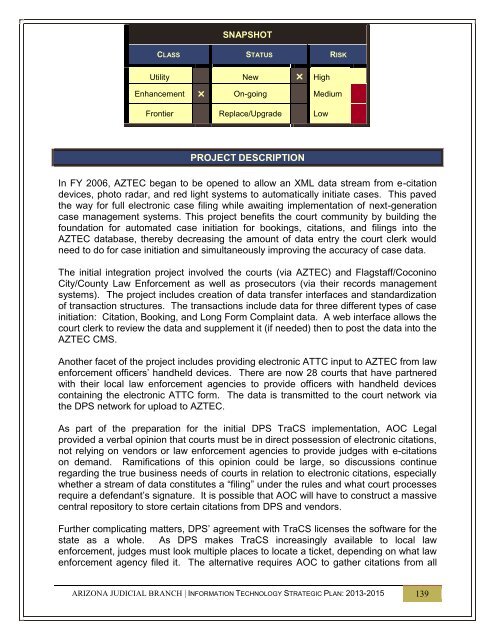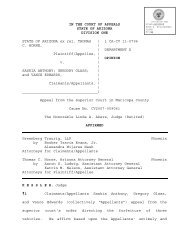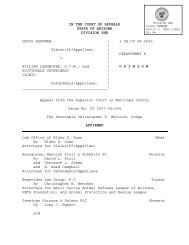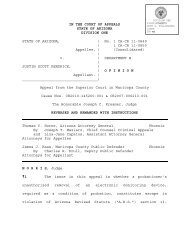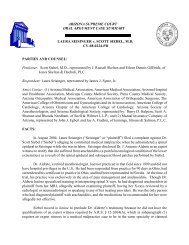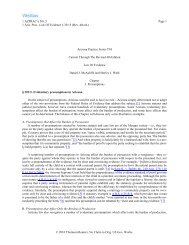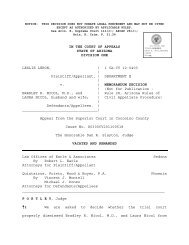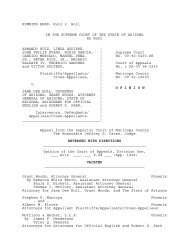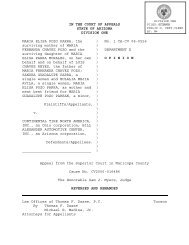Print Version - Arizona Judicial Department
Print Version - Arizona Judicial Department
Print Version - Arizona Judicial Department
Create successful ePaper yourself
Turn your PDF publications into a flip-book with our unique Google optimized e-Paper software.
SNAPSHOT<br />
CLASS STATUS RISK<br />
Utility New High<br />
Enhancement On-going Medium<br />
Frontier Replace/Upgrade Low<br />
PROJECT DESCRIPTION<br />
In FY 2006, AZTEC began to be opened to allow an XML data stream from e-citation<br />
devices, photo radar, and red light systems to automatically initiate cases. This paved<br />
the way for full electronic case filing while awaiting implementation of next-generation<br />
case management systems. This project benefits the court community by building the<br />
foundation for automated case initiation for bookings, citations, and filings into the<br />
AZTEC database, thereby decreasing the amount of data entry the court clerk would<br />
need to do for case initiation and simultaneously improving the accuracy of case data.<br />
The initial integration project involved the courts (via AZTEC) and Flagstaff/Coconino<br />
City/County Law Enforcement as well as prosecutors (via their records management<br />
systems). The project includes creation of data transfer interfaces and standardization<br />
of transaction structures. The transactions include data for three different types of case<br />
initiation: Citation, Booking, and Long Form Complaint data. A web interface allows the<br />
court clerk to review the data and supplement it (if needed) then to post the data into the<br />
AZTEC CMS.<br />
Another facet of the project includes providing electronic ATTC input to AZTEC from law<br />
enforcement officers’ handheld devices. There are now 28 courts that have partnered<br />
with their local law enforcement agencies to provide officers with handheld devices<br />
containing the electronic ATTC form. The data is transmitted to the court network via<br />
the DPS network for upload to AZTEC.<br />
As part of the preparation for the initial DPS TraCS implementation, AOC Legal<br />
provided a verbal opinion that courts must be in direct possession of electronic citations,<br />
not relying on vendors or law enforcement agencies to provide judges with e-citations<br />
on demand. Ramifications of this opinion could be large, so discussions continue<br />
regarding the true business needs of courts in relation to electronic citations, especially<br />
whether a stream of data constitutes a “filing” under the rules and what court processes<br />
require a defendant’s signature. It is possible that AOC will have to construct a massive<br />
central repository to store certain citations from DPS and vendors.<br />
Further complicating matters, DPS’ agreement with TraCS licenses the software for the<br />
state as a whole. As DPS makes TraCS increasingly available to local law<br />
enforcement, judges must look multiple places to locate a ticket, depending on what law<br />
enforcement agency filed it. The alternative requires AOC to gather citations from all<br />
ARIZONA JUDICIAL BRANCH | INFORMATION TECHNOLOGY STRATEGIC PLAN: 2013-2015 139


